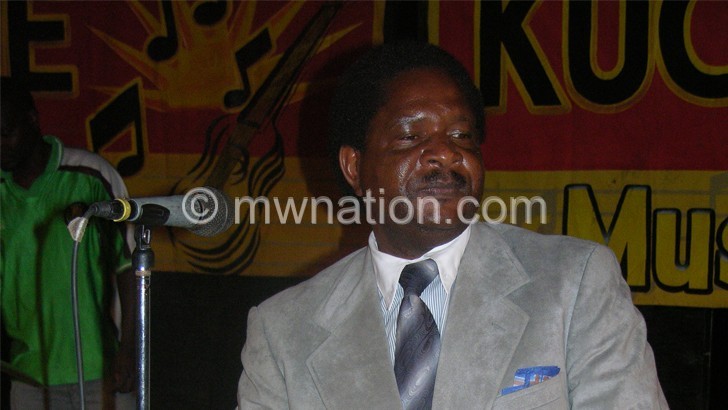Kwilimbe lives on
Benard Kwilimbe, Malawi’s first choreographer and renowned musician, walked his last mile on September 3 2017. People from all walks of life gathered at his home in Group Village Head Mgombe, Sub Traditional Authority (ST/A) Kalimanjira in Nkhotakota District Chididi Village in Nkhotakota on Septemebr 5 2017 to escort the arts and culture icon.
Kwilimbe was no ordinary Malawian neither was he an ordinary artist. He was the crème de la crème of the arts and culture industry. They say “old soldiers don’t die, they just fade away”. Kwilimbe was a soldier that guarded the arts and culture as a true patriot.
Born on September 1 1955, Kwilimbe died two days after celebrating his 62nd birthday. He dumped the teaching profession for his love of arts. He was a living Malawi arts and culture dictionary. From Chitipa’s Mwinoghe to Nsanje’s Utse and Vimbuza in Mzimba to Tchopa in Mulanje Kwilimbe knew them all and would narrate stories behind the traditional dances with such passion that even those from these areas do not possess.

It is no wonder then that some called him the “arts and culture encyclopaedia”.
In his eulogy as the Kwilimbe’s body was interred, Chief of Art and Craft in the Ministry of Civic Education, Culture and Community Development, McDonald Maluwaya described Kwilimbe’s death as a big blow to the music and creative industry and Malawi as a country.
He said although Kwilimbe retired from the civil service after working for 30 years, the ministry and individual officers had been consulting him on various issues in seeking counseling and direction.
“Apart from being a long serving officer and talented person in different fields, Kwilimbe was our first professional Choreographer and first leader of the Cultural Troupe initiated under the Art and Craft Department in 1986. That always impelled us to consult Kwilimbe for advice and direction on many things which could take us the whole day to mention one by one,” he said.
Passion for arts, culture
By the age of 21 Kwilimbe already knew what his passion was.
“I dumped teaching profession in 1987 just to fulfill my passion for the arts and culture. All along I wanted to associate myself with issues to do with culture,” Kwilimbe is quoted in The Nation newspaper.
Kwilimbe believed in ethnocentrism. It is for this reason that his work never discriminated or positioned one culture as superior to the other.
“Culture, dynamic as it were, is a way of people’s life and they celebrate the life circle and the environment thereof, the structures thereabout and the very idea of being ethnocentric.” He is quoted as saying.
Personal projects
For the past two years, subsequent to his retirement, Kwilimbe never rested as he continued to undertake different arts and cultural related projects in the country. He took advantage of his retirement to revitalise his Rainseekers Arts in Education Conservatoire (Rsaeic) Centre in Lilongwe and introduced awards for outstanding players in the country’s arts and culture as a way of giving back to the society. Rsaeic dates back to 1970s.
Visual artist Elson Kambalu, veteran musicians Maria Chidzanja-Nkhoma, Lester Mwathunga and Garven Moyo were some of the recipients of Kwilimbe’s Rsaeic certificates of recognition.
Impact of Kwilimbe’s work
Apart from being a musician, whose music was deeply rooted in cultural expressions, he was also a backbone of most arts and culture related projects in the country. He inspired many artists and aided the formation of the music bands and Music Crossroads Malawi.
Music Crossroads Malawi is now a fully Non-Governmental Organization (NGO) aimed at developing the country’s music industry through academic lessons, training and practical experience.
In his eulogy, one of renowned musician and politician who is also member of Parliamnet for Balaka North Constituency, Lucius Banda said Kwilimbe was his best advisor both in music and politics.
Lucius attributed the success of his Zembani Band to Kwilimbe.
“You are aware that Kwilimbe was not a politician, but to me he was my political advisor. Whenever I wanted to make a decision, I had to consult him. My brother Sir Paul Banda was also mentored by Kwilimbe,” Lucius said
Kwilimbe was also inspirational to all of the country’s arts associations such as Film Association of Malawi (Fama), Musicians Union of Malawi (MUM) and Malawi Writers Union (Mawu).
Mawu President Sambalikagwa Mvona highlighted the need to document the life of Kwilimbe.
“The late Bernard Kwilimbe deserves an honour. We need a complete biography of him so that people should celebrate his life and work,” Mvona said.
Kondwani Kamiyala, a journalist talks about his personal experience with Kwilimbe when he was only in primary school. Then Kwilimbe was the man conducting dress rehearsals for Kamuzu Day and Independence Day Celebrations.
“One of the people that amazed me was the one who was coordinating the whole programme: letting us know where the Police, Army and MYP parades would be slotted; where Mbumba za Kamuzu would sing and dance and all the rub,” he writes.
Kamiyala describes Kwilimbe as an exceptional man who was “a living encyclopaedia.”
“I first interacted with the man when I became a journalist. Any question on arts and culture, he was there to explain at length,” he said.
Early career life
After dumping teaching in 1987, Kwilimbe ventured into arts and culture. The same joined the Malawi National Cultural Dance Troupe. He recollected very well that his group comprised about 40 members at his time of joining (22 men and 18 women).
Kwilimbe once told The Nation: “I was the only lucky artist who was able to take talent to the office. What an opportunity!”.n





